15 aug 2014
Righteous Among the Nations for having saved a Jewish child, Elhanan Pinto, during the Nazi occupation of Holland. Pinto, born in 1932, was hidden by the Zanoli family from the spring of 1943 until the Allies liberated Holland in 1945. His parents perished in Nazi death camps.
In hiding a Jewish child, the Zanoli family took a double risk, because it was already under Nazi scrutiny for having opposed the German occupation. Zanoli’s father was sent to the Dachau concentration camp in 1941 due to his opposition to the occupation, and he subsequently died at the Mauthausen concentration camp in February 1945. Henk Zanoli’s brother-in-law was executed because of his involvement in the Dutch resistance, and one of his brothers had a Jewish fiancée, who was also killed by the Nazis.
Zanoli’s great-niece, Angelique Eijpe, is a Dutch diplomat who currently serves as deputy head of her country’s diplomatic mission in Oman. Her husband, economist Isma’il Ziadah, was born in the al-Bureij refugee camp in central Gaza. The couple has three children. Ziadah’s parents were born in Fallujah, on whose lands the town of Kiryat Gat now sits. His father died in 1987.
On Sunday, July 20, an Israeli fighter jet dropped a bomb on the Ziadah family’s home in al-Bureij. The bomb killed the family matriarch, Muftiyah, 70; three of her sons, Jamil, Omar and Youssef; Jamil’s wife, Bayan; and their 12-year-old son, Shaaban. The bombing thus orphaned Jamal and Bayan’s other five children, four daughters and a son, while bereaving Omar’s two sons and Youssef’s three sons and a daughter of their fathers. The bombing also killed Mohammed Maqadmeh, who happened to be visiting the family that day.
Zanoli, an attorney by profession, heard about the killing of the Ziadah family from his niece. As a way of expressing his shock and pain, he decided to return the medal and certificate that were awarded to him and his mother (posthumously) as Righteous Among the Nations. Because of his age and poor health, he did not do so in person, but sent them by messenger to the Israeli Embassy in The Hague – the same place where he received them in an official ceremony three years ago.
In the accompanying letter, addressed to Ambassador Haim Davon, Zanoli began by describing the price his family paid for resisting the Nazis and their successful effort to save a Jewish child.
“Against this background it is particularly shocking and tragic that today, four generations on, our family is faced with the murder of our kin in Gaza. Murder carried out by the State of Israel,” he wrote.
“The great- great grandchildren of my mother have lost their [Palestinian] grandmother, three uncles, an aunt and a cousin at the hands of the Israeli army ... For me to hold on to the honour granted by the State of Israel, under these circumstances, will be both an insult to the memory of my courageous mother who risked her life and that of her children fighting against suppression and for the preservation of human life as well as an insult to those in my family, four generations on, who lost no less than six of their relatives in Gaza at the hands of the State of Israel.”
Noting that Israel’s actions in Gaza “have already resulted in serious accusations of war crimes and crimes against humanity,” he continued, “as a retired lawyer it would be no surprise to me that these accusations could lead to possible convictions if true and unpoliticized justice is able to have its course. What happened to our kin in Gaza will no doubt be brought to the table at such a time as well.”
The Israel Defense Forces Spokesperson’s Unit did not answer Haaretz’s questions as to whether the Ziadah home was bombed by mistake, or if not, who in the house was a target and whether the IDF’s legal department considers the death of six civilians to be legitimate collateral damage. Its response said merely that the IDF invests great efforts in trying to avoid civilian casualties, is currently working to investigate all allegations of irregular incidents and will publish its conclusions after this investigation is completed.
In hiding a Jewish child, the Zanoli family took a double risk, because it was already under Nazi scrutiny for having opposed the German occupation. Zanoli’s father was sent to the Dachau concentration camp in 1941 due to his opposition to the occupation, and he subsequently died at the Mauthausen concentration camp in February 1945. Henk Zanoli’s brother-in-law was executed because of his involvement in the Dutch resistance, and one of his brothers had a Jewish fiancée, who was also killed by the Nazis.
Zanoli’s great-niece, Angelique Eijpe, is a Dutch diplomat who currently serves as deputy head of her country’s diplomatic mission in Oman. Her husband, economist Isma’il Ziadah, was born in the al-Bureij refugee camp in central Gaza. The couple has three children. Ziadah’s parents were born in Fallujah, on whose lands the town of Kiryat Gat now sits. His father died in 1987.
On Sunday, July 20, an Israeli fighter jet dropped a bomb on the Ziadah family’s home in al-Bureij. The bomb killed the family matriarch, Muftiyah, 70; three of her sons, Jamil, Omar and Youssef; Jamil’s wife, Bayan; and their 12-year-old son, Shaaban. The bombing thus orphaned Jamal and Bayan’s other five children, four daughters and a son, while bereaving Omar’s two sons and Youssef’s three sons and a daughter of their fathers. The bombing also killed Mohammed Maqadmeh, who happened to be visiting the family that day.
Zanoli, an attorney by profession, heard about the killing of the Ziadah family from his niece. As a way of expressing his shock and pain, he decided to return the medal and certificate that were awarded to him and his mother (posthumously) as Righteous Among the Nations. Because of his age and poor health, he did not do so in person, but sent them by messenger to the Israeli Embassy in The Hague – the same place where he received them in an official ceremony three years ago.
In the accompanying letter, addressed to Ambassador Haim Davon, Zanoli began by describing the price his family paid for resisting the Nazis and their successful effort to save a Jewish child.
“Against this background it is particularly shocking and tragic that today, four generations on, our family is faced with the murder of our kin in Gaza. Murder carried out by the State of Israel,” he wrote.
“The great- great grandchildren of my mother have lost their [Palestinian] grandmother, three uncles, an aunt and a cousin at the hands of the Israeli army ... For me to hold on to the honour granted by the State of Israel, under these circumstances, will be both an insult to the memory of my courageous mother who risked her life and that of her children fighting against suppression and for the preservation of human life as well as an insult to those in my family, four generations on, who lost no less than six of their relatives in Gaza at the hands of the State of Israel.”
Noting that Israel’s actions in Gaza “have already resulted in serious accusations of war crimes and crimes against humanity,” he continued, “as a retired lawyer it would be no surprise to me that these accusations could lead to possible convictions if true and unpoliticized justice is able to have its course. What happened to our kin in Gaza will no doubt be brought to the table at such a time as well.”
The Israel Defense Forces Spokesperson’s Unit did not answer Haaretz’s questions as to whether the Ziadah home was bombed by mistake, or if not, who in the house was a target and whether the IDF’s legal department considers the death of six civilians to be legitimate collateral damage. Its response said merely that the IDF invests great efforts in trying to avoid civilian casualties, is currently working to investigate all allegations of irregular incidents and will publish its conclusions after this investigation is completed.

At least 2.5 million bullets and tens of thousands of projectiles were used by the Israeli occupation army during its military offensive on the besieged Gaza Strip, an Israeli army official said on Thursday evening. The Israeli Yedioth Ahronoth quoted the anonymous army official as saying that soon the offensive was launched the Israeli army was resupplied with more 4,800 million bullets, 43,000 artillery shells, and 39,000 tank projectiles, at least 60 percent of them have been used in the military attacks on Gaza.
Israeli armored vehicles, including tanks, artilleries and bulldozers consumed around 11 million liters of fuel, while the fighter jets used about 50 million liters, twice as much as the amounts used in the 2012 Gaza offensive, according to the army official.
The costs of those military resupplies are estimated at one billion and 100 million US dollars.
At least 1,959 Gazan civilians have been massacred while some 10,000 have sustained wounds in the Israeli military aggression rocking the strip for over a month.
More than 38,086 family homes and public headquarters have been destroyed in the attacks, according to Palestinian official statistics.
Israeli armored vehicles, including tanks, artilleries and bulldozers consumed around 11 million liters of fuel, while the fighter jets used about 50 million liters, twice as much as the amounts used in the 2012 Gaza offensive, according to the army official.
The costs of those military resupplies are estimated at one billion and 100 million US dollars.
At least 1,959 Gazan civilians have been massacred while some 10,000 have sustained wounds in the Israeli military aggression rocking the strip for over a month.
More than 38,086 family homes and public headquarters have been destroyed in the attacks, according to Palestinian official statistics.

A Tunisian military aircraft left Thursday night the Tunis-Carthage International Airport for Egypt, carrying medical and food supplies for Gaza.
The Tunisian plane is considered the third of its kind sent for Gaza carrying medical supplies provided by the Tunisian ministries of health and social affairs, and the Tunisian Red Crescent.
The Tunisian Red Crescent organized Thursday a large festival amid wide participation of Tunisian artists and in the presence of head of the Tunisian Red Crescent Society Tahir Cheniti and Palestinian ambassador to Tunisia Salman Herfi.
All proceeds of the festival and donations provided Tunisian civil society groups were earmarked for Gaza.
For their part, Tunisian Prime Minister Mehdi Jomaa and Foreign Affairs Minister Mongi Hamdi renewed their strong condemnation of the Israeli barbaric aggression against the Palestinian people in the occupied territories, particularly the Gaza Strip.
They called on the international community and UN security council to provide protection for the Palestinian people.
The ministers' statements came during a symposium held in Tunis for the Tunisian diplomatic missions abroad.
The Tunisian plane is considered the third of its kind sent for Gaza carrying medical supplies provided by the Tunisian ministries of health and social affairs, and the Tunisian Red Crescent.
The Tunisian Red Crescent organized Thursday a large festival amid wide participation of Tunisian artists and in the presence of head of the Tunisian Red Crescent Society Tahir Cheniti and Palestinian ambassador to Tunisia Salman Herfi.
All proceeds of the festival and donations provided Tunisian civil society groups were earmarked for Gaza.
For their part, Tunisian Prime Minister Mehdi Jomaa and Foreign Affairs Minister Mongi Hamdi renewed their strong condemnation of the Israeli barbaric aggression against the Palestinian people in the occupied territories, particularly the Gaza Strip.
They called on the international community and UN security council to provide protection for the Palestinian people.
The ministers' statements came during a symposium held in Tunis for the Tunisian diplomatic missions abroad.

The deputy secretary general of the Democratic Front for the Liberation of Palestine said Friday the biggest obstacle facing ceasefire talks is Israel's refusal to lift the siege on Gaza.
Qais Abd al-Karim, a member of the Palestinian delegation to Cairo, said Israel claims that it has a right to besiege the Strip as long as it is not disarmed.
Abd al-Karim said that Israel demanded all manufacturing of rockets and smuggling of weapons in Gaza Strip cease, which Palestinian negotiators refused.
He added that Hamas informed the delegation of it’s approval of having PA forces at the Rafah crossing.
He explained that the issue with salaries was one of the resolved points in negotiations, and there is no international or Israeli objection to it.
Qais Abd al-Karim, a member of the Palestinian delegation to Cairo, said Israel claims that it has a right to besiege the Strip as long as it is not disarmed.
Abd al-Karim said that Israel demanded all manufacturing of rockets and smuggling of weapons in Gaza Strip cease, which Palestinian negotiators refused.
He added that Hamas informed the delegation of it’s approval of having PA forces at the Rafah crossing.
He explained that the issue with salaries was one of the resolved points in negotiations, and there is no international or Israeli objection to it.
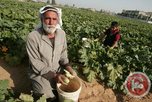
The Food and Agriculture Organization on Thursday warned that the Israeli assault on Gaza had caused extensive damage to the coastal enclave's agricultural sector and would have long-term consequences.
The FAO said in a statement that the five-week assault had "forced farmers and herders to abandon their lands and has paralyzed fishing activities, bringing local food production to a halt and severely affecting livelihoods."
"The recent fighting has resulted in substantial direct damage to Gaza's 17,000 hectares of croplands as well as much of its agricultural infrastructure, including greenhouses, irrigation systems, animal farms, fodder stocks and fishing boats," the statement continued.
The report added that Gaza had lost half of its poultry in the attack, "either due to direct hits on their shelters or lack of water, feed or care resulting from access restrictions."
Losses among Gaza's crucial fishing sector, meanwhile, were estimated at 234.6 tons, or about 9.3 percent of the yearly catch.
According to the organization, although Gaza imports most of its food needs, around 28,600 people in Gaza rely on farming (19,000 people), livestock raising (6,000) and fishing (3,600) for their livelihoods.
"Under the most recent ceasefire many farmers and herders are now able to access their lands, however resumption of food production faces serious obstacles given the damages sustained and shortages of water, electricity, inputs and financial resources, as well as ongoing uncertainty regarding the possible resumption of military activities", said Ciro Fiorillo, head of the FAO office in the West Bank and Gaza Strip.
The organization also said that food prices had been extremely volatile over the last five weeks, with upward spikes in the price of eggs estimated 40 percent, potatoes at 42 percent, and tomatoes at 179 percent.
"With local food production halted and food imports curtailed, virtually the entire population of Gaza (about 1.8 million people) is currently reliant on food aid. WFP, together with the UN Relief and Works Agency for Palestine Refugees in the Near East (UNRWA) regularly assists about 1.1 million people," the report continued, noting that another 700,000 people were relying on emergency food distribution by the Palestinian Ministry of Social Affairs, UNRWA, and WFP.
Gaza's dependency on foreign aid is a direct result of the eight-year Israeli siege on the tiny coastal territory, which has had its imports, exports, and movements of people extensively restricted since 2006.
The lifting of the siege is a key Palestinian demand in ongoing negotiations for the end of hostilities.
The FAO said in a statement that the five-week assault had "forced farmers and herders to abandon their lands and has paralyzed fishing activities, bringing local food production to a halt and severely affecting livelihoods."
"The recent fighting has resulted in substantial direct damage to Gaza's 17,000 hectares of croplands as well as much of its agricultural infrastructure, including greenhouses, irrigation systems, animal farms, fodder stocks and fishing boats," the statement continued.
The report added that Gaza had lost half of its poultry in the attack, "either due to direct hits on their shelters or lack of water, feed or care resulting from access restrictions."
Losses among Gaza's crucial fishing sector, meanwhile, were estimated at 234.6 tons, or about 9.3 percent of the yearly catch.
According to the organization, although Gaza imports most of its food needs, around 28,600 people in Gaza rely on farming (19,000 people), livestock raising (6,000) and fishing (3,600) for their livelihoods.
"Under the most recent ceasefire many farmers and herders are now able to access their lands, however resumption of food production faces serious obstacles given the damages sustained and shortages of water, electricity, inputs and financial resources, as well as ongoing uncertainty regarding the possible resumption of military activities", said Ciro Fiorillo, head of the FAO office in the West Bank and Gaza Strip.
The organization also said that food prices had been extremely volatile over the last five weeks, with upward spikes in the price of eggs estimated 40 percent, potatoes at 42 percent, and tomatoes at 179 percent.
"With local food production halted and food imports curtailed, virtually the entire population of Gaza (about 1.8 million people) is currently reliant on food aid. WFP, together with the UN Relief and Works Agency for Palestine Refugees in the Near East (UNRWA) regularly assists about 1.1 million people," the report continued, noting that another 700,000 people were relying on emergency food distribution by the Palestinian Ministry of Social Affairs, UNRWA, and WFP.
Gaza's dependency on foreign aid is a direct result of the eight-year Israeli siege on the tiny coastal territory, which has had its imports, exports, and movements of people extensively restricted since 2006.
The lifting of the siege is a key Palestinian demand in ongoing negotiations for the end of hostilities.
more popularly known, who has quickly become a favorite among the children at the hospital.
Dr. Clown's impact is clearly visible from their faces, now adorned with hearts and butterflies, while their rooms have been filled with balloons and games.
Yazan al-Saksak, who was also recovering from inhaling poisonous gas in al-Shujaiyya, said he was "sad to be leaving the hospital" because once he left he would no longer be able to play with the clowns anymore.
His brother, Muhannad, meanwhile expressed his excitement to receive a gift of coloring pencils, while their mother told Ma'an that the siblings wanted to stay as long as they could at the hospital so they could spend more time with Dr. Clown.
Dr. Clown and his clown colleagues at al-Shifa carry bags almost identical to those doctors carry, except that their content is quite different.
They wear white coats on top of their clown clothes and move between children's beds in the hospital, juggling red balls and holding plastic needles, even performing magic tricks in an attempt to lessen the children's pains and take their mind away from the horrible scenes they have survived.
Dr. Clown's work is not all play, however. He also helps the children accept their medications from the real doctor, and he said many children he had convinced to take their medicine had continued doing so even after he left.
Muhammad al-Halabiya, projects manager for World Vision in Gaza, said that the organization had opened 20 "child-friendly spaces" which focus on providing psychological support for almost 2,000 children, especially those from the hardest hit areas like eastern Shujaiyya, Rafah, Beit Hanoun, and the border areas.
Al-Halabiya added that the organization had so far visited 5,000 children in many different hospitals, shelters, and neighborhoods across the Gaza Strip.
He said that these sessions aimed particularly to help children who were traumatized or have lost a family member, adding that the project would be extended for another six months due to the high need.
The organization has also provided counseling for mothers, mentoring them on ways to support children traumatized by violence.
Dr. Clown's impact is clearly visible from their faces, now adorned with hearts and butterflies, while their rooms have been filled with balloons and games.
Yazan al-Saksak, who was also recovering from inhaling poisonous gas in al-Shujaiyya, said he was "sad to be leaving the hospital" because once he left he would no longer be able to play with the clowns anymore.
His brother, Muhannad, meanwhile expressed his excitement to receive a gift of coloring pencils, while their mother told Ma'an that the siblings wanted to stay as long as they could at the hospital so they could spend more time with Dr. Clown.
Dr. Clown and his clown colleagues at al-Shifa carry bags almost identical to those doctors carry, except that their content is quite different.
They wear white coats on top of their clown clothes and move between children's beds in the hospital, juggling red balls and holding plastic needles, even performing magic tricks in an attempt to lessen the children's pains and take their mind away from the horrible scenes they have survived.
Dr. Clown's work is not all play, however. He also helps the children accept their medications from the real doctor, and he said many children he had convinced to take their medicine had continued doing so even after he left.
Muhammad al-Halabiya, projects manager for World Vision in Gaza, said that the organization had opened 20 "child-friendly spaces" which focus on providing psychological support for almost 2,000 children, especially those from the hardest hit areas like eastern Shujaiyya, Rafah, Beit Hanoun, and the border areas.
Al-Halabiya added that the organization had so far visited 5,000 children in many different hospitals, shelters, and neighborhoods across the Gaza Strip.
He said that these sessions aimed particularly to help children who were traumatized or have lost a family member, adding that the project would be extended for another six months due to the high need.
The organization has also provided counseling for mothers, mentoring them on ways to support children traumatized by violence.

Hamas leaders in Gaza, the West Bank and Doha are holding meetings Friday before returning to Cairo to discuss a ceasefire agreement, officials said.
Senior Hamas official Izzat al-Rasheq said that Moussa Abu Marzouq will travel to Doha while a Hamas delegation arrived in Tunisia from Cairo on Friday.
Hamas chief Khaled Mashaal is based in the Qatari capital.
Both Palestinian and Israeli delegations are expected to return to Cairo on Sunday.
Palestinian factions agreed to renew a ceasefire for five days on Wednesday as both sides continue talks to reach a permanent agreement after an Israeli military offensive lasting five weeks.
Senior Hamas official Izzat al-Rasheq said that Moussa Abu Marzouq will travel to Doha while a Hamas delegation arrived in Tunisia from Cairo on Friday.
Hamas chief Khaled Mashaal is based in the Qatari capital.
Both Palestinian and Israeli delegations are expected to return to Cairo on Sunday.
Palestinian factions agreed to renew a ceasefire for five days on Wednesday as both sides continue talks to reach a permanent agreement after an Israeli military offensive lasting five weeks.
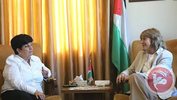
Minister al-Shakhshir and UNRWA education head Caroline Pontefract
The Palestinian Ministry of Higher Education has begun planning for the the upcoming school year in the Gaza Strip as normalcy slowly returns to the besieged coastal enclave devastated by five weeks of Israeli bombardment.
Even with 277 schools damaged in the assault -- including a large number which took direct hits -- Minister Khawla al-Shakhshir said on Friday that the ministry is hoping to begin classes within three weeks.
She said that the ministry is also focused on improving psychological services for students and families in the wake of the assault, which left nearly 2,000 dead, more than 10,000 injured, and 100,000 homeless.
The ministry's plans include individual and group activities focusing on psychological counseling and awareness with specific attention paid toward the mental well-being of children.
Al-Shakhshir also said that she had met with the director of education at the UN's Palestine refugee agency UNRWA, Caroline Pontefract, to discuss a common plan for starting the new school year in the Gaza Strip.
Al-Shakhshir said that the plan aims to enhance cooperation with UNRWA through a joint committee to prepare for the upcoming school year and help repair physical damage to educational infrastructure.
Of the 277 schools damaged by Israeli bombardment, 141 were government schools and 136 were UNRWA schools, according to the PLO.
The Palestinian Ministry of Higher Education has begun planning for the the upcoming school year in the Gaza Strip as normalcy slowly returns to the besieged coastal enclave devastated by five weeks of Israeli bombardment.
Even with 277 schools damaged in the assault -- including a large number which took direct hits -- Minister Khawla al-Shakhshir said on Friday that the ministry is hoping to begin classes within three weeks.
She said that the ministry is also focused on improving psychological services for students and families in the wake of the assault, which left nearly 2,000 dead, more than 10,000 injured, and 100,000 homeless.
The ministry's plans include individual and group activities focusing on psychological counseling and awareness with specific attention paid toward the mental well-being of children.
Al-Shakhshir also said that she had met with the director of education at the UN's Palestine refugee agency UNRWA, Caroline Pontefract, to discuss a common plan for starting the new school year in the Gaza Strip.
Al-Shakhshir said that the plan aims to enhance cooperation with UNRWA through a joint committee to prepare for the upcoming school year and help repair physical damage to educational infrastructure.
Of the 277 schools damaged by Israeli bombardment, 141 were government schools and 136 were UNRWA schools, according to the PLO.
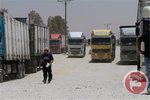
Israeli authorities said that the Kerem Shalom crossing would be opened on Friday in order to allow the entrance of "limited quantities" of supplies into the Gaza Strip.
The crossings committee of the Palestinian Ministry of the Interior said in a statement that 30 trucks of UNRWA humanitarian supplies would be entering the Gaza Strip through the crossing, the only way for goods to legally enter Gaza.
The statement added that "limited quantities" of fuel and cooking gas would also enter on Friday.
The Kerem Shalom crossing is usually closed on Fridays and Saturdays, but in recent weeks Israeli authorities have kept it open to allow the transfer of small amounts of humanitarian supplies.
Gaza is currently experiencing one of its worst humanitarian crises in years amid a five-week Israeli assault by land, air, and sea that has killed nearly 2,000 people, destroyed or severely damaged the homes of around 100,000, and caused massive damage to infrastructure.
Israel has imposed a siege on the Gaza Strip for the last eight years that has completely limited all imports and exports into the Strip and crippled the tiny coastal enclave's economy.
The crossings committee of the Palestinian Ministry of the Interior said in a statement that 30 trucks of UNRWA humanitarian supplies would be entering the Gaza Strip through the crossing, the only way for goods to legally enter Gaza.
The statement added that "limited quantities" of fuel and cooking gas would also enter on Friday.
The Kerem Shalom crossing is usually closed on Fridays and Saturdays, but in recent weeks Israeli authorities have kept it open to allow the transfer of small amounts of humanitarian supplies.
Gaza is currently experiencing one of its worst humanitarian crises in years amid a five-week Israeli assault by land, air, and sea that has killed nearly 2,000 people, destroyed or severely damaged the homes of around 100,000, and caused massive damage to infrastructure.
Israel has imposed a siege on the Gaza Strip for the last eight years that has completely limited all imports and exports into the Strip and crippled the tiny coastal enclave's economy.

A Ministry of Health official warned Friday that the death toll in Gaza was expected to continue to rise as dozens succumbed to wounds sustained during the offensive and more bodies were recovered under the rubble of homes.
Healthy ministry spokesman Ashraf al-Qidra said that the death toll had hit 1,980 on Friday with at least 10,181 injured.
Dozens have been added to the death count despite a fragile calm maintained through back-to-back ceasefires in recent weeks.
Al-Qidra said that many of those injured are still in a critical condition, and are not expected to survive their wounds.
The low survival rate is also due in part to the continued lack of appropriate medical supplies and facilities for injured patients, while 18-hour daily power cuts and a lack of fuel for generators aggravate the condition of those hospitals still functioning.
The PLO estimates that that 17 hospitals and seven clinics were damaged during the assault, 10 hospitals and 44 primary health clinics were closed, 22 ambulances were damaged, and 83 health personnel injured, along with 19 health personnel who died in Israeli airstrikes.
The UN Office for the Coordination of Humanitarian Affairs said in a report on Thursday that supplies of medicine had managed to return to their June levels, when medicines were running at about 70 percent of their required volume due to the Israeli siege and Egyptian limitations on imports into Gaza.
This is a stark improvement from July, however, when the UN body said that "27 per cent of essential medicines and 52 per cent of medical disposables were at zero stock."
OCHA also said that bed occupancy in Gaza's surgical wards had fallen from 100 percent to 80 percent as hospitals obtained permission from Israel to transfer some patients to East Jerusalem and Turkey for care.
At the height of the Israeli assault in early August, patients were routinely doubling up in beds or sleeping on the floor due to the lack of space as well as the Israeli shelling of a number of hospitals, which drastically reduced available capacity across the Strip.
Despite the improvements, the inability of medical authorities to properly administer to the injured during the bombardment has had lasting effects being felt as the death toll rises rapidly in the days since.
The massive scale of the destruction of residential neighborhoods -- at least 16,800 homes were obliterated or severely damaged -- means that it could also take weeks to find all of the dead beneath the rubble.
Al-Qidra said that civil defense and ambulance crews were currently working around the clock to search for the many who are still reported missing in Gaza.
As the days pass, however, the possibility of finding survivors under the rubble was fading and the focus was on recovering bodies.
He added that the ministry's toll also kept increasing as many families had buried their dead without taking them first to the hospital, as these families had feared being targeted amid intense Israeli bombardment.
Healthy ministry spokesman Ashraf al-Qidra said that the death toll had hit 1,980 on Friday with at least 10,181 injured.
Dozens have been added to the death count despite a fragile calm maintained through back-to-back ceasefires in recent weeks.
Al-Qidra said that many of those injured are still in a critical condition, and are not expected to survive their wounds.
The low survival rate is also due in part to the continued lack of appropriate medical supplies and facilities for injured patients, while 18-hour daily power cuts and a lack of fuel for generators aggravate the condition of those hospitals still functioning.
The PLO estimates that that 17 hospitals and seven clinics were damaged during the assault, 10 hospitals and 44 primary health clinics were closed, 22 ambulances were damaged, and 83 health personnel injured, along with 19 health personnel who died in Israeli airstrikes.
The UN Office for the Coordination of Humanitarian Affairs said in a report on Thursday that supplies of medicine had managed to return to their June levels, when medicines were running at about 70 percent of their required volume due to the Israeli siege and Egyptian limitations on imports into Gaza.
This is a stark improvement from July, however, when the UN body said that "27 per cent of essential medicines and 52 per cent of medical disposables were at zero stock."
OCHA also said that bed occupancy in Gaza's surgical wards had fallen from 100 percent to 80 percent as hospitals obtained permission from Israel to transfer some patients to East Jerusalem and Turkey for care.
At the height of the Israeli assault in early August, patients were routinely doubling up in beds or sleeping on the floor due to the lack of space as well as the Israeli shelling of a number of hospitals, which drastically reduced available capacity across the Strip.
Despite the improvements, the inability of medical authorities to properly administer to the injured during the bombardment has had lasting effects being felt as the death toll rises rapidly in the days since.
The massive scale of the destruction of residential neighborhoods -- at least 16,800 homes were obliterated or severely damaged -- means that it could also take weeks to find all of the dead beneath the rubble.
Al-Qidra said that civil defense and ambulance crews were currently working around the clock to search for the many who are still reported missing in Gaza.
As the days pass, however, the possibility of finding survivors under the rubble was fading and the focus was on recovering bodies.
He added that the ministry's toll also kept increasing as many families had buried their dead without taking them first to the hospital, as these families had feared being targeted amid intense Israeli bombardment.
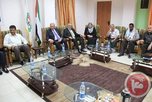
The Palestinian unity government will take responsibility for the reconstruction of Gaza following Israel's devastating month-long assault, deputy prime minister Ziad Abu Amr said Friday.
"The Palestinian government will take responsibility for the Gaza Strip and its needs," the deputy prime minister said during a visit to Gaza's Shifa hospital.
Abu Amr visited the hospital with Minister of Public Works, Mufid al-Hasayneh, Minister of Labor, Mamun Abu Shahla, Salim al-Saqqa the Minister of Justice and Haifa al-Agha, Minister of Women's Affairs.
The official praised the "heroic" actions of medical staff in Gaza while health minister Yoused Abu al-Rish said the visit was a boost amid the suffering of medics who were injured or killed during Israel's offensive.
Medics and nurses had not been paid for months before Israel's offensive began, Abu al-Rish added.
Abu Amr arrived in Gaza on Tuesday in his first visit since the formation of a new unity government.
The visit marks the first time Israel has allowed officials from the Palestinian unity government to enter Gaza through Erez since its formation.
Hamas and the PLO, dominated by Fatah, signed a surprise reconciliation agreement in April to end years of rivalry.
"The Palestinian government will take responsibility for the Gaza Strip and its needs," the deputy prime minister said during a visit to Gaza's Shifa hospital.
Abu Amr visited the hospital with Minister of Public Works, Mufid al-Hasayneh, Minister of Labor, Mamun Abu Shahla, Salim al-Saqqa the Minister of Justice and Haifa al-Agha, Minister of Women's Affairs.
The official praised the "heroic" actions of medical staff in Gaza while health minister Yoused Abu al-Rish said the visit was a boost amid the suffering of medics who were injured or killed during Israel's offensive.
Medics and nurses had not been paid for months before Israel's offensive began, Abu al-Rish added.
Abu Amr arrived in Gaza on Tuesday in his first visit since the formation of a new unity government.
The visit marks the first time Israel has allowed officials from the Palestinian unity government to enter Gaza through Erez since its formation.
Hamas and the PLO, dominated by Fatah, signed a surprise reconciliation agreement in April to end years of rivalry.
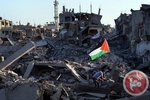
A truce agreement will be signed with Israel once the five-day ceasefire ends, an Islamic Jihad spokesman said Friday.
Yousef al-Hasayneh told Ma'an that the Palestinian side agreed to a five-day truce to give Egypt more time to remove some "technical issues" hindering a final agreement.
"We expect a complete truce agreement to be signed right as the five-day ceasefire ends," al-Hasayneh said. "The delegation has made much progress in ending the siege and the offensive on Palestinians."
The agreement will end Israel's military offensive, ease the siege, expand the fishing zone and increase imports into Gaza, especially construction materials, the Jihad official said.
Construction of an airport and seaport will be discussed a month after signing the agreement.
"Egypt is the sponsor for the agreement, but there is a more important sponsor, which is the resistance," al-Hasayneh said.
"We, as the Islamic Jihad, are not interested in American sponsorship because we do not trust the United States, the partner of Israel, who supplies them with arms and money."
He stressed that any Islamic Jihad would respond to any Israeli attack.
A day earlier, deputy secretary-general of Islamic Jihad, Ziad al-Nakhaala, said "great progress" had been made in the talks and an agreement would be announced soon.
More than 1,950 Palestinians -- the vast majority civilians -- have been killed in the five-week Israeli assault on the Gaza Strip, which the UN said destroyed or severely damaged the homes of more than 100,000 Gazans.
Yousef al-Hasayneh told Ma'an that the Palestinian side agreed to a five-day truce to give Egypt more time to remove some "technical issues" hindering a final agreement.
"We expect a complete truce agreement to be signed right as the five-day ceasefire ends," al-Hasayneh said. "The delegation has made much progress in ending the siege and the offensive on Palestinians."
The agreement will end Israel's military offensive, ease the siege, expand the fishing zone and increase imports into Gaza, especially construction materials, the Jihad official said.
Construction of an airport and seaport will be discussed a month after signing the agreement.
"Egypt is the sponsor for the agreement, but there is a more important sponsor, which is the resistance," al-Hasayneh said.
"We, as the Islamic Jihad, are not interested in American sponsorship because we do not trust the United States, the partner of Israel, who supplies them with arms and money."
He stressed that any Islamic Jihad would respond to any Israeli attack.
A day earlier, deputy secretary-general of Islamic Jihad, Ziad al-Nakhaala, said "great progress" had been made in the talks and an agreement would be announced soon.
More than 1,950 Palestinians -- the vast majority civilians -- have been killed in the five-week Israeli assault on the Gaza Strip, which the UN said destroyed or severely damaged the homes of more than 100,000 Gazans.

Barack Obama and Binyamin Netanyahu
After officials in the Obama administration say they were ‘blindsided’ by the shipment of ammunition from the Pentagon to Israel, the administration decided to put a temporary halt on the transfer of a number of hellfire missiles.
The move appears to be a ‘tit for tat’ response to the Israeli purchase of ammunition directly from the Pentagon, according to analysts familiar with U.S.-Israel relations.
President Obama recently gave a speech assuring his administration’s full support for the Israeli offensive in Gaza, and authorized an additional $225 million approved by the U.S. Congress for Israel’s Iron Dome missile defense system – a system whose effectiveness has been called into question by military experts, in recent weeks.
But, the decision on Thursday to delay the shipment of Hellfire missiles indicates that the Obama administration is, for the first time, hesitating in its previously unrestricted, blanket support for Israel.
An unnamed official within the Obama administration told reporters from the Wall Street Journal that the ongoing Israeli assault on Gaza has "persuaded them that Mr. Netanyahu and his national security team are both reckless and untrustworthy."
The Wall Street Journal also quoted unnamed Israeli officials saying that there is a rift between the Obama administration and the government of Binyamin Netanyahu in Israel. The unnamed official was quoted as saying, “We've been there before with a lot of tension with us and Washington. What we have now, on top of that, is mistrust and a collision of different perspectives on the Middle East."
Israel’s ambassador to the U.S. tried to downplay any divisions between the Obama and Netanyahu administration, telling the Wall Street Journal, "Israel deeply appreciates the support we have received during the recent conflict in Gaza from both the Obama administration and the Congress for Israel's right to defend itself and for increased funding of Iron Dome.”
Some analysts claim that Netanyahu is planning to “wait out” the Obama administration’s term in office before engaging in any further ‘peace talks’ with the Palestinians, while continuing to expand settlements in the meantime.
After officials in the Obama administration say they were ‘blindsided’ by the shipment of ammunition from the Pentagon to Israel, the administration decided to put a temporary halt on the transfer of a number of hellfire missiles.
The move appears to be a ‘tit for tat’ response to the Israeli purchase of ammunition directly from the Pentagon, according to analysts familiar with U.S.-Israel relations.
President Obama recently gave a speech assuring his administration’s full support for the Israeli offensive in Gaza, and authorized an additional $225 million approved by the U.S. Congress for Israel’s Iron Dome missile defense system – a system whose effectiveness has been called into question by military experts, in recent weeks.
But, the decision on Thursday to delay the shipment of Hellfire missiles indicates that the Obama administration is, for the first time, hesitating in its previously unrestricted, blanket support for Israel.
An unnamed official within the Obama administration told reporters from the Wall Street Journal that the ongoing Israeli assault on Gaza has "persuaded them that Mr. Netanyahu and his national security team are both reckless and untrustworthy."
The Wall Street Journal also quoted unnamed Israeli officials saying that there is a rift between the Obama administration and the government of Binyamin Netanyahu in Israel. The unnamed official was quoted as saying, “We've been there before with a lot of tension with us and Washington. What we have now, on top of that, is mistrust and a collision of different perspectives on the Middle East."
Israel’s ambassador to the U.S. tried to downplay any divisions between the Obama and Netanyahu administration, telling the Wall Street Journal, "Israel deeply appreciates the support we have received during the recent conflict in Gaza from both the Obama administration and the Congress for Israel's right to defend itself and for increased funding of Iron Dome.”
Some analysts claim that Netanyahu is planning to “wait out” the Obama administration’s term in office before engaging in any further ‘peace talks’ with the Palestinians, while continuing to expand settlements in the meantime.

A dead body of an elderly man was pulled out on Thursday evening from beneath the rubble of a building bombed by the Israeli occupation army during its recent military attacks on the besieged Gaza Strip.
The victim was identified as 64-year-old Ibrahim Ismail Abu Awda, from Beit Hanoun, north of Gaza. Abu Awda was killed in the ongoing Israeli offensive that has been targeting the Strip for 35 uninterrupted days, bringing Gaza death toll to 1,962, mostly children and women.
10,193 others suffered different injuries, many of them are in critical conditions.
Dozens of heinous massacres committed by the Israeli army in the Strip and hundreds of civilian homes and buildings were razed to the ground during indiscriminate aerial and artillery attacks on the densely-populated enclave.
The victim was identified as 64-year-old Ibrahim Ismail Abu Awda, from Beit Hanoun, north of Gaza. Abu Awda was killed in the ongoing Israeli offensive that has been targeting the Strip for 35 uninterrupted days, bringing Gaza death toll to 1,962, mostly children and women.
10,193 others suffered different injuries, many of them are in critical conditions.
Dozens of heinous massacres committed by the Israeli army in the Strip and hundreds of civilian homes and buildings were razed to the ground during indiscriminate aerial and artillery attacks on the densely-populated enclave.
Page: 109 - 108 - 107 - 106 - 105 - 104 - 103 - 102 - 101 - 100 - 99 - 98 - 97 - 96 - 95 - 94 - 93 - 92 - 91 - 90
Truce violations List of names Pictures of martyrs
Days: Aug: 26 - 25 - 24 - 23 - 22 - 21 - 20 - 19 - 18 - 17 - 16 - 15 - 14 - 13 - 12 - 11 - 10 - 9 - 8 - 7 - 6 - 5 - 4 - 3 - 2 - 1
July: 31 - 30 - 29 - 28 - 27 - 26 - 25 - 24 - 23 - 22 - 21 - 20 - 19 - 18 - 17 - 16 - 15 - 14 - 13 - 12 - 11 - 10 - 9 - 8
Days: Aug: 26 - 25 - 24 - 23 - 22 - 21 - 20 - 19 - 18 - 17 - 16 - 15 - 14 - 13 - 12 - 11 - 10 - 9 - 8 - 7 - 6 - 5 - 4 - 3 - 2 - 1
July: 31 - 30 - 29 - 28 - 27 - 26 - 25 - 24 - 23 - 22 - 21 - 20 - 19 - 18 - 17 - 16 - 15 - 14 - 13 - 12 - 11 - 10 - 9 - 8


